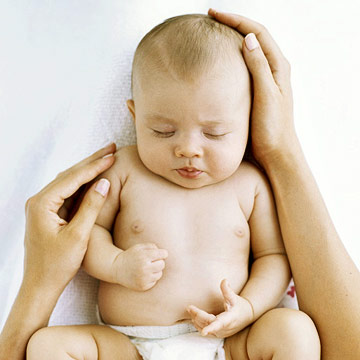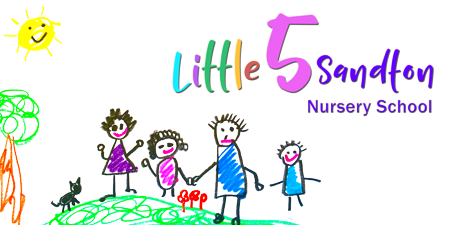Your Baby’s Developing Senses
The ability to see, smell, and hear are among your baby’s most important learning tools. Find out how her senses develop from conception to her first year–and what you can do to boost them.
Erika Silverman will never forget her son’s reaction the first time she held him, just seconds after he was born. “I was amazed to see Oren go from crying to calm as soon as our skin touched,” says the mom from Charlotte, North Carolina. According to the experts, Oren’s reaction was typical. Like all babies, he was born with well-developed senses that helped him adjust to his new environment. When he inhaled his mother’s scent, felt the warmth of her body, and heard her whisper “Hello” (a familiar sound from his time in the womb), Oren was immediately comforted. “We have this impression that babies are helpless, but they absorb a lot of information with their senses to bond with their caregivers and explore things around them,” says Lise Eliot.
Sight
Developing baby: By the third trimester, a foetus can detect bright light inside the womb. Depending on factors such as the thickness of a mom-to-be’s fat, her muscle, and her clothing, enough natural light may seep in during the final two months for him to see his hand and leg movements, according to research published in Developmental Psychobiology.
Newborn: His vision is blurry, and he sees things best from about 10 inches away (the approximate distance from your face while he’s nursing). High-contrast hues, including black-and-white patterns and primary colour pairings, fascinate him.
2 months: He can keep a steady gaze on moving objects, such as a rotating mobile. Within another month he’ll begin to focus on objects up to ten feet away, though he still can’t make out fine details.
5 months: He’s developing eye-body coordination. Notice how he looks at something and then tries to reach for it?
Around 6 months: He can focus at any distance and is mastering the idea of depth perception–when you push him in front of his swing, he “gets” that the bigger you look, the closer you are.
12 months: His vision is virtually on par with that of an adult’s.
Help him develop his vision by:
- Holding him close so he can study the contrasts on your face — your dark pupils against the whites of your eyes, your hairline or lipstick next to your skin.
- Laying him on a colourful mat with mirrors during tummy time He’ll be mesmerized by his own good looks and will like the colourful border.
- Strengthening his eye-hand coordination by playing rhythmic hand games such as pat-a-cake and “Open shut them.”
Smell
Developing baby: During the third trimester, your baby can detect odours from the foods you eat and aromas you inhale through your amniotic fluid, Dr. Eliot says. Yep, she smells your chili-dog fix.
Newborn: She arrives with a keen sense of smell and recognizes the comforting scent that emanates from your breasts, your underarms, even your beauty products. When your infant catches a whiff of you, she might turn her head toward your breast, start moving her mouth (as if nursing), or stop crying. Breastfed babies might even be able to “sniff out” mom sooner than bottle-fed ones because they are held close to her body more often.
Help her develop her sense of smell by:
Exposing her to a variety of scents, and telling her what she’s smelling. Here are some examples of safe household items and objects to place underneath her nose — just be sure she doesn’t inhale or touch irritating spices, such as wasabi, powdered mustard, chili powder, or pepper, any of which can create a burning sensation in the back of her nose.
- Coffee
- Ripe fruit
- Herbs
- Aromatic flavourings and seasonings (vanilla extract, cinnamon, paprika)
- Crayons
- Baby shampoo
- Clean diapers
- Leather shoes
- Flowers
Hearing
Developing baby: At around 20 weeks, your unborn child can start detecting sounds. In the noisy womb, he likely hears a garbled version of your voice even more prominently than your thumping heart, according to a study published in the American Academy of Paediatrics’ online journal NeoReviews. During the third trimester you may feel him shifting in response to external sounds. Abdominal ultrasounds revealed that 35-week-old foetuses moved their bodies around more when researchers played a recording of Brahm’s Lullaby, according to a study published in Developmental Science.
Newborn: He remembers sounds from the womb, such as your voice and songs he’s heard. Studies have shown that he can discriminate between different speech sounds, such as “ba” and “da,” and he’ll shift his eyes toward noises around him, like a jiggling rattle.
3 months: Your infant may attempt to duplicate sounds he hears–such as “ahhhh,” and “ehhhh” — by cooing.
5 months: The excitement of hearing his own voice and your responses may turn him into a babbling machine.
Around 8 months: He understands the meaning of many words he hears, and as he inches toward 1, your child will be able to say a few of them even if they aren’t perfectly articulated (such as “mil” for “milk”).
Help him develop his sense of sound by:
- Making music together with toy instruments, such as the shakers and rattlers.
- Reading picture books and telling him what he’s looking at so he associates words with objects. When he’s around 8 or 9 months, ask if he can point out things on the page (“Where is the bird? Can you show me?”). This exercise helps build his speech skills.
Touch
Developing baby: Studies have shown that a foetus’s mouth begins to develop feeling at about seven weeks. By 14 weeks, much of the baby’s head is sensitive to touch.
Newborns: There’s nothing a newborn loves more than skin-to-skin contact. Full-term and late preterm newborns who share bare-chested snuggles with their moms (sometimes called “kangaroo care”) may breathe better, cry less, and breastfeed longer. At birth, your child can decipher differences in the texture, shape, and weight of objects. During the first few months, infants explore largely by mouth.
6 Months: You’ll see her little hands grab everything within reach, which helps her learn about them.
6 to 9 Months: Once she starts crawling, she’ll be able to choose what she touches–and you may notice your pets start to hide
Help develop your baby’s sense of touch by:
- Transporting her in a carrier instead of a stroller – she craves closeness.
- Massaging her
- Taking baths together
- Laying out different textured objects–carpet squares, stacking cups, squishy bath toys, foam shapes, mildly abrasive sandpaper–and describe each one as she touches them for a fun tactile experience
Taste
Developing baby: A foetus’s taste buds begin forming at about seven weeks in utero. During the second trimester, your unborn child will likely start sampling the flavour buffet in your amniotic fluid.
Newborns: Your infant has an undeniable sweet tooth and welcomes breast milk and formula, both of which contain sugar. Babies aren’t big fans of sour and bitter flavours.
4 months: He becomes fond of salty flavours. Depending on the foods he’s exposed to, these natural taste preferences can vary. Breastfed babies may be more open to a range of flavours because they’re used to the changing taste of your breast milk (garlicky one day, mint-infused the next).
Help develop your baby’s sense of taste by:
- Seating your baby at the dinner table so he can watch you eat. The more he sees you enjoying yourself–by saying “yum” after you take a bite, for instance–the more open he’ll be to trying new foods.
- Combating your baby’s reluctance to sample new things once you start him on solids by saying, “Oh good, more for me” and eating some of his portion. You’re showing him that you think the food is tasty, and he may wind up wanting to try it.
- Introducing spicy foods slowly. You might mix rice with a drop of mild curry sauce or go light on the Mexican seasoning in taco meat, then build up slowly. By promoting a pleasant eating experience, you’re improving his odds of having an adventurous palate.



Nancy Rones
Authorhttps://www.parents.com/baby/development/physical/your-babys-developing-senses/